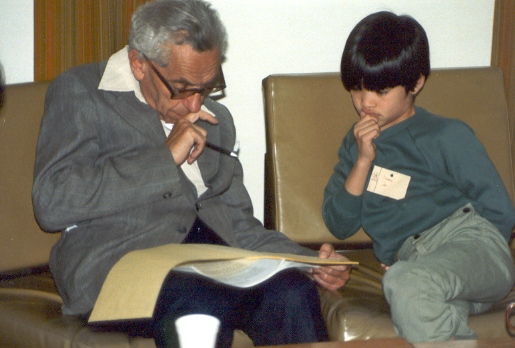
Mathematician Paul Erdős had no home, no job, and no hobbies. Instead, for 60 years he wandered the world, staying with each of hundreds of collaborators just long enough to finish a project, and then moving on. In this week’s episode of the Futility Closet podcast we’ll meet the “magician of Budapest,” whose restless brilliance made him the most prolific mathematician of the 20th century.
We’ll also ponder Japanese cannibalism in World War II and puzzle over a senseless stabbing.
Intro:
Elbert Hubbard published 12 blank pages in 1905.
A duck spent 18 months in the U.S. 2nd Marine Division in 1943.
Sources for our feature on Paul Erdős:
Paul Hoffman, The Man Who Loved Only Numbers, 1999.
The magisterial biography of Erdős. The first chapter is here.
Bruce Schechter, My Brain Is Open, 2000.
Béla Bollobás, “Paul Erdős (1913-96),” Nature, 383:6601 (Oct. 17, 1996), 584.
Melvin Henriksen, “Reminiscences of Paul Erdős,” Mathematical Association of America (accessed June 10, 2017).
László Babai, Carl Pomerance, and Péter Vértesi, “The Mathematics of Paul Erdős,” Notices of the AMS 45:1 (January 1998).
László Babai and Joel Spencer, “Paul Erdős (1913–1996),” Notices of the AMS 45:1 (January 1998).
Ronald L. Graham, Jaroslav Nesetril, Steve Butler, eds., The Mathematics of Paul Erdős, 2013.
Rodrigo De Castro and Jerrold W. Grossman, “Famous Trails to Paul Erdős,” Mathematical Intelligencer 21:3 (January 1999), 51–53.
Bruce Torrence and Ron Graham, “The 100th Birthday of Paul Erdős/Remembering Erdős,” Math Horizons 20:4 (April 2013), 10-12.
Krishnaswami Alladi et al., “Reflections on Paul Erdős on His Birth Centenary,” Parts I and II, Notices of the American Mathematical Society 62:2 and 62:3 (February and March 2015).
Béla Bollobás, “To Prove and Conjecture: Paul Erdős and His Mathematics,” American Mathematical Monthly 105:3 (March 1998), 209-237.
“Information About Paul Erdős (1913-1996),” Oakland University (accessed June 13, 2017).
Calla Cofield, “An Arbitrary Number of Years Since Mathematician Paul Erdős’s Birth,” Scientific American, March 26, 2013.
Béla Bollobás, “Obituary: Paul Erdős,” Independent, Oct. 2, 1996.
N Is a Number: A Portrait of Paul Erdős, Kanopy Streaming, 2014.
“Paul Erdős,” MacTutor History of Mathematics Archive (accessed June 10, 2017).
Above: Erdős teaching 10-year-old Terence Tao in 1985. Tao is now recognized as one of the world’s finest mathematicians; he received the Fields Medal in 2006.
Listener mail:
Wikipedia, “Chichijima Incident” (accessed June 23, 2017).
Charles Laurence, “George HW Bush Narrowly Escaped Comrades’ Fate of Being Killed and Eaten by Japanese Captors,” Telegraph, Feb. 6, 2017.
James Bradley, Flyboys, 2003.
This week’s lateral thinking puzzle was contributed by listener Waldo van der Waal, who sent this corroborating link (warning — this spoils the puzzle).
You can listen using the player above, download this episode directly, or subscribe on iTunes or Google Play Music or via the RSS feed at http://feedpress.me/futilitycloset.
Please consider becoming a patron of Futility Closet — on our Patreon page you can pledge any amount per episode, and we’ve set up some rewards to help thank you for your support.
You can also make a one-time donation on the Support Us page of the Futility Closet website or buy merchandise in our store.
Many thanks to Doug Ross for the music in this episode.
If you have any questions or comments you can reach us at podcast@futilitycloset.com. Thanks for listening!
